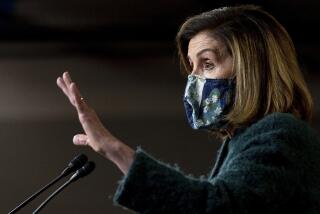Can Military Success Help Spur a Recovery? : Bush should try to cash in on popularity to revive economy
Euphoria over the spectacular success of the American military in the Persian Gulf is raising great expectations that the war’s end will be an elixir for the economy. The triumphant return of men and women to the home front is likely to unleash new pride and patriotism, but will that be enough to restore consumer confidence? There has been general consensus and worry among economists and officials that a long war would extend the recession. But it is less clear that a short one will accelerate a recovery. The war was certainly a big factor in undermining consumer confidence--but it wasn’t the only cause of the economic slowdown.
TRADING OFF: Yet it just might be a big factor in turning things around. For example, President Bush, flush with success from the Gulf War and reveling in public opinion polls that put his popularity at 85% and above, needs to cash in on that goodwill and reassure Americans that they can rebuild the home front--that, indeed, the same kind of commitment and discipline exhibited on the Gulf battlefields is needed now on the economic front.
The President is taking a hands-off approach toward the recession, figuring the economy will shortly work itself out of the slowdown. Instead, he should be setting an agenda to ensure the nation’s competitiveness for sustained, long-term growth. That means providing a well-educated work force, encouraging science and technology and reducing the huge income gap between the rich and poor with a health-care and other initiatives. Recovering from the recession alone won’t quell consumer jitters.
This recession, unlike past ones, has been complicated by problems in the banking industry and a resulting credit crunch. Uncertainties persist amid more layoffs, high debt levels, declining values of some assets and a slump in manufacturing. So economic signals continue to be mixed. Each month the troops stayed in the Mideast, shoppers stayed away from stores. Consumer spending--it accounts for two-thirds of the nation’s economic activity--fell in January, posting its biggest drop in four years. Personal incomes in January also showed their largest decline in more than two years. But consumer confidence rose slightly in February for the first time in five months. Still, it was just marginally higher than January’s 10-year low.
Some short-term economic benefits from the war include lucrative contracts to U.S. firms to rebuild Kuwait, stability in oil prices and a bullish stock market. Interest rate cuts by the Federal Reserve Board should begin to make borrowing money cheaper and qualify more home buyers for mortgages, luring them back into the market.
The war’s end will spur some consumer spending and business investment, but a very sharp rebound is not expected. The recession, barring some unforeseen circumstances, should be short, with growth returning by mid-1991.
Not all the economic news has been bad. Booming trade has been the one pocket of strength. And much of the economy’s future growth will depend on exports. The merchandise trade deficit shrank last year to $108.68 billion, the smallest imbalance since 1983. Only sluggish foreign markets could deter further recovery.
TRADING UP: With trade an engine for growth, Bush should use his considerable hero capital to attack the impasse in world trade talks and smooth the way for a free-trade agreement with Mexico. He must move adroitly on budget negotiations with Congress, casting aside political nit-picking. He must also press his bank reform efforts and take some initiative on health care. And he can officially abandon his politically unpopular capital gains tax proposal.
U.S. military might has been demonstrated; our economic might is about to be tested. As in the war, the President must lead the way.
More to Read
Get the L.A. Times Politics newsletter
Deeply reported insights into legislation, politics and policy from Sacramento, Washington and beyond. In your inbox three times per week.
You may occasionally receive promotional content from the Los Angeles Times.










